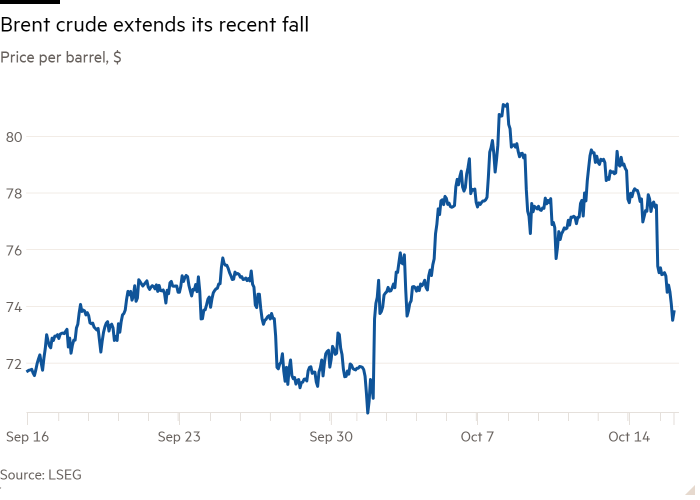
Stay informed with free updates
Simply sign up to the Oil myFT Digest — delivered directly to your inbox.
Oil prices fell sharply on Tuesday as fears that Israel would attack Iranian facilities receded and new forecasts damped the outlook for Chinese demand.
Brent crude, the international benchmark, fell as much as 5.3 per cent in early trading to $73.34 a barrel, before staging a partial recovery to trade 3.8 per cent lower. WTI, its US counterpart, dropped as much as 5.6 per cent before stabilising down 4.1 per cent.
The declines meant crude prices have fallen by a fifth from its peak this year, above $90 a barrel in April.
Prices have jumped in recent weeks over fears that the conflict between Israel and Iran would disrupt supplies. Tuesday’s sell-off was partly prompted by reassurances overnight from Israel that it would not seek to attack Iran’s oil infrastructure.
Instead, Israeli officials have told the US that they are planning to limit any counterstrike against Iran to military targets, according to two people close to the talks.

Meanwhile both Opec, the oil cartel, and the International Energy Agency trimmed their forecasts this week for oil demand next year, after continuing weakness in the Chinese market.
The IEA said on Tuesday that oil demand in China would grow by just 150,000 barrels a day in 2024, after consumption dropped for the fourth consecutive month in August, by 500,000 b/d.
“Chinese oil demand continues to undershoot expectations and is the principal drag on overall growth,” the IEA said.
It trimmed its overall forecast for oil demand growth this year by 40,000 b/d to 860,000 b/d. The agency also said oil demand would grow by about 1mn b/d in 2025, slightly higher than it predicted last month.
China, which accounted for almost 70 per cent of the world’s oil demand growth in 2024, will account for just a fifth of this year’s increase, the IEA said, underlining the rapid slowdown as the economy has weakened and the country’s shift to electric vehicles has accelerated.
Opec also cut its forecast for 2024 oil demand growth on Monday, but is projecting a much stronger outcome of 1.93mn b/d.
The IEA, which manages oil reserves for OECD countries, also said there were now more than 1.2bn barrels of stocks, and plenty of spare capacity among Opec members, to cushion any supply disruption.
“As supply developments unfold, the IEA stands ready to act if necessary,” the agency said. “For now, supply keeps flowing, and in the absence of a major disruption, the market is faced with a sizeable surplus in the new year.”